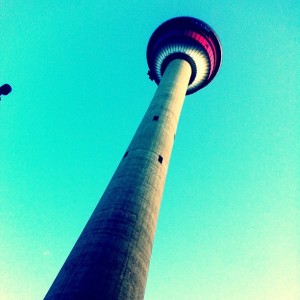In the autumn of 1982 the BSir’s DJ Henri Flesh and I jetted from Hamburg to Berlin’s Tempelhof aerport to see our friends from Helen Wheels play at a concert halle. We checked into a four-star hotel and toured the city. Of course the wall at Brandenburg Gate anda viewing from a raised platform of the Wall’s death zone.
After the fall of the Thousand Year Reich, Stalin approved the Red Army’s plunder of the Soviet zone, rippling the economy of the DDR, while the Marshall Plan spurred the growth of the Bundesrepublik. Millions fled the East, mostly through Berlin.In 1961 Erik Honneker the DDR’s communist leader, instructed the army to erect a wall to stop the loss of workers. Many attempted to flee, few succeeded, and hundreds were shot by the security forces.
A long walk back to the Kurfurstdamm revealed the Porsche’s resurrection from Hitler’s Gottdammerung to a sparkling weltstadt offering the wealth of the Free World; Mercedes, Hugo Boss fashion, chocolate and the delights of the KaDeWe shopping mecca. The only sign of the War was the ruins of Kaiser Wilhelm Memorial Church. That night after the concert we partied at the infamous Dzungel. Sex, drugs, dancing, as if no one expected to lived till tomorrow.
We slept from dawn till 11. A quick swim at our elegant Hotel. No fruhstuck of hard bread and cheese. Only black coffee.
The concierge asked where we were going and after I replied, “Ost Berlin.”
He frowned and said, “Be careful. Because of the Pershing missiles, there is tension between the East and West.”
“We’re not spies.” Reagan had authorized the deployment of these powerful, highly accurate missiles throughout West Germany. The Kremlin had retaliated with threats and the left of the Bundesrepublik protested this upbuild-up with marches on the streets. This was the frontier of the Cold war.
“Be careful. Speak to no one. You might not be spies, but everyone on the other side of the wall is a potential informer to Stasi.”
“Thanks for the warning.” He handed in our keys and then taxied had to Checkpoint Charlie, the legendary crossing from West Berlin to East Berlin.
A burly DDR female border guard processed our passports. Her stocky build looked like she had been training for the 1984 Olympics as a men’s shot putter. Henri whispered that she loved her, as we exchanged twenty-five BundesRepublik marks into East German currency. He was into big women.
The Parisian said nothing. As direct descendants of the Gestapo the Stasi were well known for their lack of humor.
Clearing the checkpoint the differences between the two Berlins was immediately apparent from the wastelands between bullet-pocked bukdings and the lack of parked cars. The desolation resembled the devastated Lower East Side of the 1970s. At least no buildings were on flames like the East Village.
“So we speak to no one.” Henri meant women.
“Do what you want, but Stasi’s informants numbered in the hundreds of thousands and reported on friends and families. The headquarters in Licthenberg holds the worn clothing of thousands of suspected anti-communists to aid specially trained dogs to run potential escapees from the DDR escapees. All in numbered in IDed glass jars.”
“Les Boches toujours le meme.” Henri’s family had lived the occupation in Paris. After two wars feew French had any good to say about Germans.
A single Trabant puttered by sounding like an underpowered golf cart. The few pedestrians crossed the street to avoid any contact with us. None of them looked like Stasi, but informers are us. We avoided them on the way to the old Reichtag. It also bore scars of the War. Neither of us had a camera, which was a good thing, since several men were observing us with practiced neglect.
None of the stores had anything of interest and neither of us wanted to intrude to bother the owners, but both of us were thirsty and Henri suggested that we go to a bierkellar. We entered and all conversation ceased between the score of proelatarian workers. None of them stated us and kept their gaze at the table, especially after two men entered the bar. I ordered us two bier. One DDR DM. I told the bartender, “Zwei bier fur alleman.” I put my money on the bar and pointed to the two Stasi to show that there was no hard feeling. They remained standing and no one left their chairs to grab a bier.
“Les Boches. Pas de change.” Henri down his bier. I downed mine. I would have like another, but this wasn’t the time. Henri tried to give away his money of the way to Checkpoint Charlie. We ere like the plague. A danger. Even children knew enough to steer clear of westerners. Getting back to the border, Henri said, “One day they will be as free as us. Let’s get some real beer.”
And that was all the freedom we needed in this world.
That’s an another city on the town.







